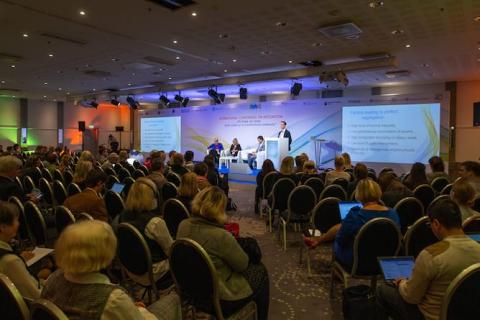An international conference entitled ‘Shared Language: Integration through Multilingualism’ is being held in Tallinn on 14 & 15 November. The conference will bring together renowned experts from the United States, Canada, the United Kingdom, Latvia, Denmark, Norway, Germany and Estonia. The presentations and discussions at the conference will focus on identity, education and labour market issues in the light of multiculturalism.
A live broadcast of the conference, whose working language will be English, can be followed online at integrationconference.ee.
PROGRAMME:
14.11.2019
9.00–10.00 Registration, morning coffee
10.00–10.15 Opening of the conference, opening remarks
10.15–11.00 Keynote speaker Robert Phillipson (Copenhagen Business School, Denmark) “English, panacea or pandemic”
11.00–12.30 Plenary session “Prevalence of English as a challenge to multilingualism”. Moderator – Geda Paulsen (Institute of the Estonian Language, Estonia)
- Antonella Sorace (University of Edinburg, UK) “The Challenge of maintaining multilingualism in a globalized world”
- Sanita Lazdiņa (Rezekne Academy of Technologies, Latvia) “Language as a Value: from Languaging to Translanguaging in a Multilingual Society”
- Mirjam Laurisaar (Pipedrive, Estonia) “Multilingualism in international company, case of Pipedrive”
12.30–13.30 Lunch
13.30–15.00 Plenary session “Multilingualism, identity and integration”. Moderator – Marianna Makarova (Government Office, Estonia)
- Nayr Correia Ibrahim (Nord University, Norway) “Multilingual-identity turn: developing a multilingual set within a language rights perspective”
- Sari Pöyhönen (University of Jyväskylä, Finland) “Official bilingualism, monolingual integration training and multilingual lives – challenges for integration policies”
- Elin Thordardottir (McGill Univeristy, Canada) “Multilingual adolescents in two distinct language environments: Effects of exposure, utility, language policy, identity and attitudes”
15.00–15.30 Coffee-break
15.30–17.00 Plenary session “Multilingualism in education – policy, threats and opportunities”. Moderator – Birute Klaas-Lang (University of Tartu, Estonia)
- Theo Marinis (University of Konstanz, Germany) “Language development in multilingual children and challenges as well as opportunities for educational systems”
- Kerttu Rozenvalde (Latvian Language Agency, Latvia) “Multilingual language use and ideology of One Language at a Time: Insights into language issues in higher education”
15.11.2019
8.30–9.00 Vice-minister of education of Czech Republic Václav Velčovský “The Czech Republic – Towards New Challenges in Language Education”
9.00–10.30 Plenary session “Integration through multilingual education”. Moderator – Didzis Melbiksis (UNHCR)
- Erika Hoff (Florida Atlantic University, USA) “The nature of dual language skills children at the time of school among children from minority language homes”
- Monika S. Schmid (Essex University, UK) “Language attrition and professional re-immersion”
- Claudia Maria Riehl (Ludwig-Maximilians-Universität München, Germany) “Why multilingual education makes a difference: Educational programs and their contribution to integration”
10.30–11.00 Coffee-break
11.00–12.30 Workshops
- Monika S. Schmid “First language attrition and professional re-immersion” (in English)
- Ministry of the Interior “What is on Your mind, Family migration?” (in English)
- “Transvaal” Kristina Norman’s video and discussion (in Estonian/Russian)
- Ministry of Culture “Integrating Estonia 2030” (in Estonian, simultaneous translation to English)
12.30–14.00 Lunch
14.00–15.00 Political debate between Estonian political parties. Moderator – Jüri Nikolajev (ERR)
The full programme can be found on the conference website.
The working language of the conference will be English, with simultaneous interpreting into Estonian and Russian.
The event is being run by the Integration Foundation in cooperation with the Ministry of Culture. Also supporting the organisation of the conference are the embassies of the United States, Finland, Germany, Canada and the Czech Republic in Estonia, the British Council and other partners.

